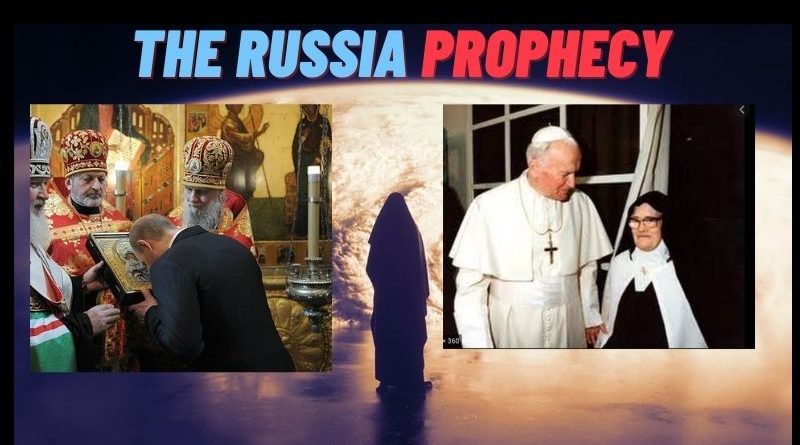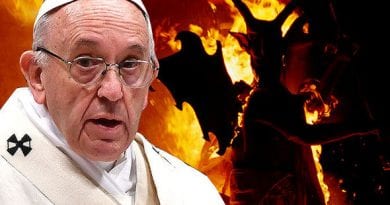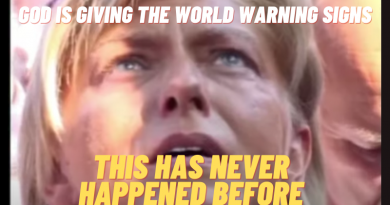The Coming “Holy War” – Tensions Rise – US slams Russian plan to block Black Sea – Putin Lectures America for abandoning its Christian roots
Russia has been holding last-minute military exercises near commercial shipping lanes in the Black Sea that threaten to strangle Ukraine’s economy, according to an internal document from Ukraine’s ministry of defense reviewed by Axios.
Why it matters: With the eyes of the world on the massive buildup of troops in eastern Ukraine, the leaked memo shows Russian forces escalating their presence on all sides of the Ukrainian border.
Zoom in: On Friday, Russia announced it intends to block foreign ships in parts of the Black Sea for military exercises through October — an escalation that a State Department spokesman condemned as an example of Moscow’s “ongoing campaign to undermine and destabilize Ukraine.”
- Just days earlier, the Pentagon had called off plans to send two U.S. warships to the Black Sea, according to Reuters. An explanation was not provided.
- The leaked Ukrainian document assesses that the total area of Russian military exercises takes up 27% of the Black Sea — a proportion that has steadily crept up, in a sign of efforts to establish de facto control over international waters.
- The Russians are also leveraging civilian infrastructure for military purposes, according to Ukraine. The document says that Russia has installed radars on natural gas platforms that it seized from Ukraine after the 2014 annexation of Crimea.
Between the lines: Radar systems on civilian infrastructure could allow the Russian military to establish awareness and a presence in areas where it shouldn’t be.
- Just this month, Russian state media accused Poland of “provocative” activities near the controversial and nearly completed Nord Stream 2 pipeline in the Baltic Sea.
- A U.S. official who tracks these developments closely said “the weaponization of energy infrastructure in the Black Sea should be a warning sign of what’s to come” if Nord Stream 2, which would bypass Ukraine and deliver Russian gas directly to Europe, comes to fruition in the Baltic.
- While Biden has said he opposes Nord Stream 2, he is unlikely to sanction European allies like Germany to stop its last stretch of construction.
The big picture: Much of the concern over Russia’s aggression in recent weeks has been directed not at its activities in the Black Sea, but at its border with eastern Ukraine, where the European Union’s top diplomat claims more than 150,000 troops have now amassed.
- The leaked document shows that Russian forces are escalating their presence on all sides of the Ukrainian border with units that boast a vast array of capabilities, including many that suggest more sinister intentions than a simple show of force.
- The document suggests that Russia’s actions could be designed to distract from domestic problems ahead of legislative elections in September, or to counter NATO exercises and bully Ukraine into reversing its “positive political developments.”
- But it also finds a “high probability” that Russia may be seeking to provoke Ukrainian forces in order to create a pretext for a military incursion, as it did in Georgia in 2008.
For the record: In response to a request for comment, the Russian Embassy in Washington directed Axios to an April 15 briefing by foreign ministry spokeswoman Maria Zakharova, who accused NATO countries of “encouraging Kiev’s militarist sentiments.”
Winston Churchill once described Russia as a “riddle, wrapped in a mystery, inside an enigma.” Churchill’s words ring true today as we see Russia, almost mysteriously, emerge onto the world stage as a military adversary; a geopolitical rival; and a vexing riddle that nobody in Washington, D.C. has quite figured out. Obama got it wrong when he mocked Mitt Romney’s concerns that Russia was a menace to world order, calling the Russians a “regional power.”
D.C.-based Russian foreign policy experts have a dismal track record as prognosticators. Mr. Leon Aron, in Foreign Policy magazine, writes: “Every revolution is a surprise. Still, the latest Russian Revolution must be counted among the greatest of surprises. In the years leading up to 1991, virtually no Western expert, scholar, official, or politician foresaw the impending collapse of the Soviet Union.
After the Soviet Union’s collapse, the conventional wisdom was that Russia would become an inconsequential, backward nation easily ignored by the developed world. But somehow it didn’t work out that way.
We now see Vladimir Putin on CNN gleefully pushing a button launching a hypersonic nuclear missile into the stratosphere, claimed to be “unstoppable” and capable of reaching any city in the United States. Rather than fading away, Russia is confronting the United States, and the two countries have returned to a simmering Cold War-like state of coexistence. Princeton professor Stephen Cohen says that for the first time since the Cuban Missile Crisis, a nuclear war threat is real.
A greater mystery than Russia’s newfound political prominence is Russia’s sudden role as the world’s leading defender of Christianity. It seems inconceivable that former KGB operative Vladimir Putin now chastises Western nations for abandoning their Christian roots. Putin says:
The people in the West are actually ashamed of their religious affiliation and are indeed frightened to speak about them. Christian holidays and celebrations are abolished or neutrally renamed as if they were ashamed of those Christian holidays. With this method one hides away the deeper moral value of theses celebrations. And those countries try to force this model onto other countries, globally. I am deeply convinced that this is a direct way to the degradation and primitivization of culture. This leads to a deeper demographic and moral crisis in the West.
Putin has not only talked the talk of defending Christianity; he has backed up his talk with military intervention. Russia has repeatedly made the assertion that his country’s move into Syria to support the embattled government was, in part, motivated to protect Christians sects who were victims of genocide at the hands of ISIS.
The disturbing irony of the spiritual awakening in Russia is the sudden embrace of religious bigotry by United States media and many powerful members of Congress who represent this country with the motto “In God We Trust.” “The dogma lives loudly within you,” opined Senator Feinstein, unhappy that the person she was speaking to was Catholic. Senator Kamala Harris went in for her own kill shot by expressing her outrage toward a judicial nominee for being a member of a Catholic volunteer organization that would dare to have religious beliefs.
This is Bolshevism – bigotry, plain and simple. Left-leaning intellectuals in this country would scoff and such labels – they are the “tolerants,” after all, the ones with those awful neighborhood signs about “welcoming all” – but then so did members of the Russian Revolution, who had great slogans as well before they started killing priests and blowing up churches.
Today, the United States government is taking away religious freedoms and moving forward into the future with a toxic relationship with people of faith. Major corporations have gathered their torches and pitchforks alongside government and joined the rebellion. Facebook censors images of the crucifix; TV hosts call Christianity a “mental disorder” and everybody laughs; major universities hold classes mocking Christianity with topics like “Christian privilege.” Pro-life organizations are labeled as “hate groups.”
In contrast, the Russian government is funding the restoration of Orthodox churches with public dollars. Russian Orthodox bishops are regularly seen at military installations conducting religious ceremonies, chanting prayers, carrying icons of the Virgin Mary, and madly tossing holy water everywhere. At a ceremony at the opening of a new Russian Orthodox cathedral, Putin said, “It is impossible to imagine Russia without Christianity.” The Christian renewal taking place in Russia is a real event with incalculable geopolitical consequences, so it is imperative that USA policymakers understand Russia’s total commitment to defending its culture, a culture that begins with Russians’ belief that Christianity is the foundation of their country.
Putin two weeks ago expressed his outrage with secretary of state Pompeo for interfering in a major dispute between the Ukrainian Orthodox Church and the Russian Church. Pompeo said, “This political move is not good news for religious freedom. This is a clear and flagrant violation of freedom of religion. The split could turn into a heavy dispute, if not bloodshed.” In July of last year, at a ceremony celebrating the 1,030th anniversary of the adoption of Christianity, Putin said: “Christianity was the starting point for the formation and development of Russian statehood.”
The table has been set. Today we see two nuclear powers with tenacious commitments to their own righteousness – one spiritual, the other secular. Ominously, it seems that Russia and the United States are on some inevitable path toward conflict guided by an invisible, sinister force determined to usher in the apocalypse.
Stephen Ryan is the author of the Amazon bestselling political thriller The Madonna Files and is the founder of MysticPost.com, a Catholic online news magazine.






Everything is connected back to the consequences of the voter fraud. Watch a documentary now at https://frankspeech.com